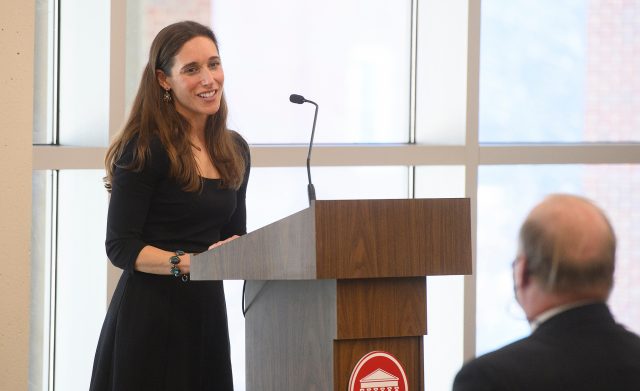
Laura Martin, associate director of the Grisham-McLean Institute, has been appointed to a national think tank devoted to building relationships between the U.S. Department of Housing and Urban Development and higher education. Photo by Thomas Graning/Ole Miss Digital Imaging Services
OXFORD, Miss. – Laura Martin, associate director of the University of Mississippi‘s Grisham-McLean Institute for Public Service and Community Engagement and director of M Partner, has been appointed to a national think tank devoted to building relationships between higher education and the U.S. Department of Housing and Urban Development.
“This is an exciting outgrowth of work that the Grisham-McLean Institute has conducted related to housing and community engagement,” Martin said. “The institute has held place-based partnerships for many years now with our VISTA project in north Mississippi and our CEED initiative in the Delta.
“This new collaboration gives us more opportunities to fulfill our obligation to the community where we are located. The housing piece requires us to look at our immediate community to see how we can be a partner and address challenges.”
The HUD + Higher Ed Education Network is led by Campus Compact in conjunction with the Anchor Institutions Task Force, the Coalition of Urban and Metropolitan Universities, and the University Economic Development Association. The network will focus on strengthening connections and collaborations between higher education institutions and the 64 HUD field offices throughout the country.
Martin is the sole Southeastern representative among the 30 strategic leaders that make up the partnership’s think tank. Along with her work at the Grisham-McLean Institute, Martin has served for more than three years on the Lafayette, Oxford and University Home Ownership Management Enterprise board.
“I see this as an opportunity to merge the community engagement work that I do on behalf of the university with my passion for affordable housing,” she said.
The network will collaborate with HUD experts and leaders to develop ideas and resources for campuses to engage with HUD field offices, and initiatives at the local network level will focus on issues such as worker empowerment, maternal and infant health, eviction prevention, landlord outreach, housing security and access, broadband access and digital literacy, and cultural competency.
“I regularly hear from community partners across north Mississippi that housing access and affordability are areas of increasing concern in the wake of the COVID-19 pandemic and with growing inflationary pressures,” Martin said. “Poverty alleviation is at the core of the mission of the Grisham-McLean Institute, and promoting housing security is central to that work.”
Martin said that she’s looking forward to learning from national leaders in this field and representatives from other campuses.
“I think of my role as finding ways to connect resources on campus to partnership opportunities in local communities,” she said. “Our involvement in this collaboration is elevating that work to a national stage.
“I will be looking for ways that I can tap into national resources and models that have been successful on other campuses and bring them here.”
Campus Compact is a national coalition of colleges and universities committed to advancing the public purposes of higher education. Castel Sweet, UM director of community engagement, is a strategy and visioning fellow for Campus Compact.
“As one of the largest and oldest associations dedicated to supporting civic and community engagement among higher education, Campus Compact provides benefits and resources for every aspect of campus,” Sweet said. “The HUD initiative is just one example of meaningful work that will result from our membership in this association.”